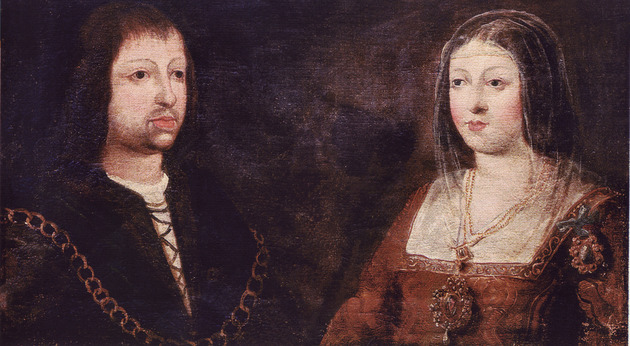Isabel I of Castile, also known as Isabel the Catholic, was born on November 22, 1451, in Madrigal de Altas Torres and died on November 26, 1504, in Medina del Campo.
She was not destined to inherit the crown of Castile, as she was third in line of succession.
However, the intrigues with the nobles, the matrimonial alliances and the rejection of the Castilian nobility to her half-brother Henry IV, elevated her as Queen of Castile.
Elizabeth of Castile's life

Isabel was the daughter of Juan II of Castile (1405-1454) and Isabel of Portugal (1428-1496).
It must be borne in mind that the Iberian Peninsula, at this time, was divided into kingdoms and landlords that sought to ally themselves, and also wage war when necessary. There were four Christian kingdoms - Portugal, Castile, Aragon, Navarre - and the Muslim kingdom of Granada.
To govern these regions, a delicate balance was needed between the nobility and the king. Thus, marriages between Christian princes in these territories were common.
Isabel's father, Juan II of Castile, already had a son and heir from his first marriage, who would rise to the Castilian throne under the name of Henry IV (1425-1474).
For their part, the children of the second marriage, Isabel (1451-1504) and Alfonso (1453-1468), had little chance of ruling. Especially Isabel, because according to the succession laws of the time, Alfonso, being a man, would take precedence over her. So the chances of her being queen were remote.
Dispute for the throne between Isabel and Henry IV
Henrique IV reigned in Castilla, but he still had no heirs. He married Juana de Portugal for the second time. This would give him the long-awaited offspring, with a daughter who would also be called Juana, in 1462.
However, her enemies spread the rumor that the girl was not the daughter of the king but of one of his nobles, Beltrán de la Cueva (1435-1492).
Part of the nobility that opposed Henry IV declared war on the king and symbolically stripped him of his throne, in the episode known as Farsa de Ávila, in 1465.
Her half-brother, Alfonso, is crowned sovereign, the conflict breaks out and lasts until Alfonso's sudden death in 1468.
Elizabeth's Pact with Henry IV
In order to neutralize a possible rebellion by her half-sister Isabel, both reach an agreement: Isabel would be declared heir to the throne of Castile, but would only marry with the approval of Henry IV.
It is important to emphasize that neither of the two respected this agreement, as Henrique IV stripped Isabel of her title of heiress, passing it on to her daughter Juana.
For her part, Isabel secretly married Prince Ferdinand (1452-1516), of the Kingdom of Aragon, in October 1469.
After the death of Henry IV, two factions fight for the throne of Castile: on the one hand, Isabel and Fernando, and on the other, the supporters of Juana.
Four years of war followed, from 1474 to 1479, which only ended with the Treaty of Alcáçovas, where Juana recognized Isabel as Queen of Castile.
Reign of Isabel of Castile and Fernando of Aragon

The marriage of Fernando and Isabel made possible the beginning of the union of the two biggest kingdoms of the Iberian Peninsula, Castile and Aragon.
However, both nations would retain their institutions, their language and their justice. Effective integration would only take place in the next generation, with the couple's heir.
conquest of grenade
Once peace was established in Castile, Isabel and Fernando began to dedicate themselves to several common projects such as continuing the Reconquest of the Iberian Peninsula.
To do so, they undertook the military conquest of the Muslim kingdom of Granada in 1492.
great navigations
Likewise, the sovereigns financed the expedition of Christopher Columbus to America, also occurred in 1492.
In order to guarantee peace with the Kingdom of Portugal, the sovereigns signed several agreements with the neighbor, especially the Treaty of Tordesillas where the boundaries of the new world were set.
Inquisition and expulsion of Jews
Likewise, the expansion of the Catholic religion was an important issue for these monarchs.
With the objective of transforming all the inhabitants of the kingdom into subjects, in 1492 the Decree of Alhambra was proclaimed. In it, it was said that Jews living in Castile were forced to choose between conversion or leaving the territory.
In this way, several Jews chose to leave the region and headed to Portugal and Morocco. Those who remained and even those who converted would be persecuted by the Inquisition.
Death of Isabel of Castile
Isabel and Fernando had seven children, five of whom reached adulthood. Crown Prince Juan died in 1497, leaving Isabel inconsolable and depressed.
The queen died in Medina del Campo, in 1504, without seeing the consolidation of her project to unify the Iberian Peninsula.
Curiosities about Isabel of Castile
- The title of "Catholic Kings" was bestowed by Pope Alexander VI in 1496, in recognition of his help to expand the Catholic faith and aid in freeing the Papal States from the French invasion.
- Two daughters of Isabel and Fernando became queens: Juana, better known as "A Louca" was sovereign of Castile, while Catherine of Aragon was Queen of England by marriage to King Henry VIII (1491-1547).
- Both Isabel and Fernando wanted to be buried in Granada and their tombs are in the cathedral of this city.
Keep searching on the subject.:
- Spain
- absolutist state
- discovery of america
- Moors



